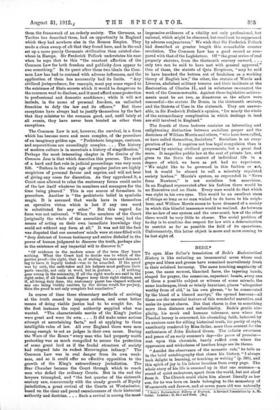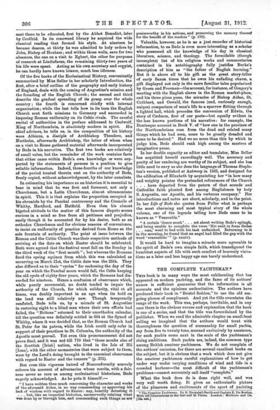BEDE.• To open Miss Seller's translation of Bede's Ecclesiastical History
is like unfurling an immemorial arras whose cool greys and blues and greens have remained marvellously fresh in their subdued harmony. The same touching angulariby of pose, the same earnest, blanched faces, the tapering hands, shaped for prayer, the conscious, expectant beasts, every one of them a possible subject or witness of some miracle, the same landscapes, bleak or trimly luxuriant, places "altogether worthy from of old," in his own phrase, " to be consecrated by the blood of a blessed martyr," the opened heavens—all these are the essential texture of this wonderful narrative, and make its quaint charm. But that charm is due to something more than distance and unfamiliarity. Bede's gentle sim- plicity, his meek and humane tolerance, save where the Paschal heresy is concerned. his abounding faith, balanced by an anxious care for sifting historical truth, his purity of style, excellently rendered by Miss Seller, more than account for the enthusiasm of John Richard Green. The infinite sweetness and peace of an early summer's day—the peace of promise—. rest upon this chronicle, barely ruffled even where the oppression and wickedness of heathen kings are its theme. " Amidst the observance of the monastic rule," he tells us in the brief autobiography that closes his history, " I always took delight in learning, or teaching, or writing" (p. 388), and this spirit of joy in his labour breathes from every page. The whole story of his life is summed up in that one sentence—a round of quiet endeavour, apart from the world, but not aloof from it. The Church could claim him almost literally as her son, for he was born on lands belonging to the monastery of Wearmonth and Jarrow, and at seven years old was naturally
• Bede's Ecclesiastical liatory of England. A Revised Translation by A. IL Sellar. London : G. Be .l and Sons. 158.]
sent there to be educated, first by the Abbot Benedict, later by Ceolfrid. In its renowned library be acquired the wide classical reading that formed his style. At nineteen he became deacon, at thirty he was admitted to holy orders by John, Bishop of Hexham; and within those walls, save for two absences, the one on a visit to Egbert, the other for purposes of research at Lindisfarne, the remaining thirty-two years of his life were spent. Acting as his own secretary and cojyist, he can hardly have known leisure, much less idleness.
Of the five books of the Ecclesiastical History, conveniently summarized by Miss Seller in her scholarly Introduction, the first, after a brief outline of the geography and early history of England, deals with the coming of Augustine's mission and the founding of the English Church; the second and third describe the gradual spreading of its grasp over the whole country ; the fourth is concerned chiefly with internal organization; while the last tells how in its turn the English Church sent forth missions to Germany and succeeded in imposing Roman uniformity on its Celtic rivals. The careful recital of authorities in the preface addressed to Ceolwulf, King of Northumbria, is absolutely modern in spirit. His chief advisers, he tells us, in the composition of his history were Albinus, a disciple of Archbishop Theodore, and
Northelrn, afterwards Archbishop, the latter of whom when on a visit to Rome gathered material afterwards incorporated by Bede in his narrative. The first two books are relatively of small value, but the remainder of the work contains facts that either came within Bede's own knowledge or were sup- ported by the statements of persons in a position to give reliable information. Indeed, three-fourths of our knowledge of the period treated therein rest on the authority of Bede, freely copied, without acknowledgment, by the later annalists.
In estimating his importance as an historian it is essential to bear in mind that he was first and foremost, not only a Churchman, but a Latin Churchman, almost ultramontane in spirit. This it is that explains the proportion occupied in his chronicle by the Paschal controversy and the Councils of Whitby, Hertford, and Hatfield. Even then his almost bigoted attitude to the matter of this famous dispute seems curious in a mind so free from all pettiness and prejudice, easily though it be accounted for by his desire, both as an orthodox Churchman and for obvious reasons of convenience, to insist on uniformity of practice derived from Rome as the sole fountain of authority. The point at issue between the Roman and the Celtic Church was their respective methods of arriving at the date on which Easter should be celebrated. Both were agreed that the festival must fall on the Sunday in the third week of the "first month "; but whereas the Romans fixed the spring equinox from which this was calculated as occurring on March 21st, the Celtic date was the 25th. They also differed as to their "cycles" for reckoning the day of the year on which the Paschal moon would fall, the Celts keeping the old cycle of eighty-four years, which the Romans had dis- carded for nineteen. Hence a confusion of observance which, while purely ceremonial, no doubt tended to impair the authority of the Church, for which solidarity, vital at all times, was doubly important in an age when its hold on the land was still relatively new. Though temporarily confuted, Bede tells us, by a miracle of St. Augustine in restoring sight to a blind man where their own efforts had failed, the "Britons" returned to their unorthodox calendar, till the question was definitely settled in 664 at the Synod of Whitby, where it was decided that, as the Roman Church had St. Peter for its patron, while the Irish could only refer in support of their practices to St. Columba, the authority of the Apostle must prevail. Yet even this pronouncement did not prove final, and it was not till 710 that "those monks also of the Scottish [Irish] nation, who lived in the Isle of Hii [Iona], with the other monasteries that were subject to them, were by the Lord's doing brought to the canonical observance with regard to Easter and the tonsure" (p. 375).
But even this vigorous hatred of Nonconformity scarcely colours his account of adversaries whose merits, with a fair- ness never so rare as among ecclesiastical historians, Bede eagerly acknowledged. As he puts it himself :—
" I have written thus much concerning the character and works of the aforesaid Aidan, in no way commending or approving his lack of wisdom with regard to Easter: nay, heartily detesting it . . . but, like an impartial historian, unreservedly relating what was done by or through him, and commending such things as are
praiseworthy in his actions, and preserving the memory thereof for the benefit of the readers " (p. 170).
Valuable, however, as he is as a just recorder of historical information, to us Bede is even more interesting as a scholar who possessed all the knowledge of his day in classical literature, science, and theology. The formidable (though
incomplete) list of his religious works and commentaries contained in his autobiography fully justifies Burke'e description of him as "the father of English learning." But it is above all to his gift as the great story-teller of early Saxon times that he owes his unfading charm, a gift displayed not only in the more familiar tales popularized
by Green and Freeman—the account, for instance, of Gregory's meeting with the English slaves in the Roman market-place, and his three pious puns, the miracles of Bishop Aidan, St.
Cuthbert, and Oswald, the famous (and, curiously enough, unique) comparison of man's life to a sparrow flitting through a lighted hall, which precedes the conversion of Edwin, the story of Ca3dmon, first of our poets—but equally evident in the less known portions of his narrative : for example, the Dantesque account in Book V. of "how one in the province of the Northumbrians rose from the dead and related many things which he had seen, some to be greatly dreaded and some to be desired." Had we no more than this by which to judge him, Bede should rank high among the masters of imaginative prose.
In her double capacity as editor and translator, Miss Seller has acquitted herself exceedingly welL The accuracy and purity of her rendering are worthy of its subject, and she has little need to envy as she does the language of Thomas Staple- ton's version, published at Antwerp in 1565, and designed for the edification of Elizabeth by acquainting her " in bow many and weighty pointes the pretended refourmers of the Church . . have departed from the patern of that sounde and Catholike faith planted first among Englishmen by holy S. Augustin, our Apostle, and his vertuous company." Her introductions and notes are short, scholarly, and to the point. In her Life of Bede she quotes from Fuller what is perhaps the most charming and most typical story of the whole volume, one of the legends telling how Bede came to be known as " Venerable."
"A certain 'dunce monk' . . . set about writing Bede's epitaph, and being unable to complete the verse Hic cunt in fossa Bedae
• . . ossa,' went to bed with his task unfinished. Returning to it in the morning, he found that an angel had filled the gap with the word venerabilis '" (p. xxxiv).
It would be hard to imagine a miracle more agreeable to the spirit of Bede's own simple faith, which transfigured the humblest aspects of life with such comfort of heavenly visita- tions as a later and less happy age can barely understand.



































 Previous page
Previous page